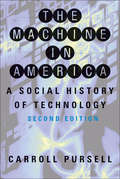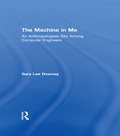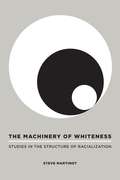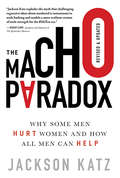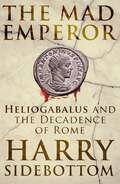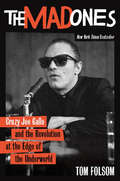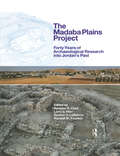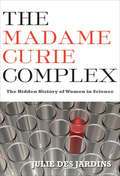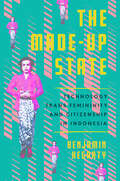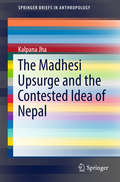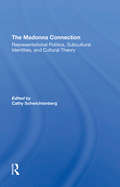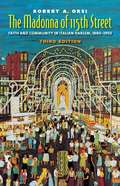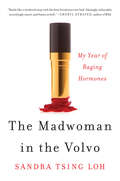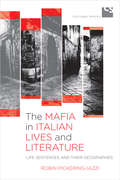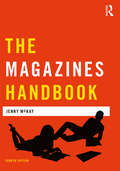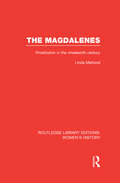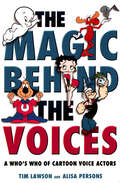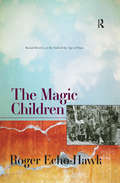- Table View
- List View
The Machine in America: A Social History of Technology
by Carroll Pursell2008 Outstanding Academic Title, Choice MagazineFrom the medieval farm implements used by the first colonists to the invisible links of the Internet, the history of technology in America is a history of society as well. Arguing that "the tools and processes we use are a part of our lives, not simply instruments of our purpose," historian Carroll Pursell analyzes technology's impact on the lives of women and men, on their work, politics, and social relationships—and how, in turn, people influence technological development.Pursell shows how both the idea of progress and the mechanical means to harness the forces of nature developed and changed as they were brought from the Old World to the New. He describes the ways in which American industrial and agricultural technology began to take on a distinctive shape as it adapted and extended the technical base of the industrial revolution. He discusses the innovation of an American system of manufactures and the mechanization of agriculture; new systems of mining, lumbering, and farming, which helped conquer and define the West; and the technologies that shaped the rise of cities. In the second edition of The Machine in America, Pursell brings this classic history up to date with a revised chapter on war technology and new discussions on information technology, globalization, and the environment.
The Machine in Me: An Anthropologist Sits Among Computer Engineers
by Gary Lee DowneyFirst Published in 1998. Routledge is an imprint of Taylor & Francis, an informa company.
The Machinery of Whiteness: Studies in the Structure of Racialization
by Steve MartinotIn this follow up to his book, The Rule of Racialization—which considered the way class structure is formed in the U. S. —Steve Martinot now examines how the structures of racialization reside at the core of all social, cultural, and political institutions in the U. S. In The Machinery of Whiteness, Martinot examines how race and racism are produced in the United States, analyzing the politics of racialization, and the preponderance of racial segregation and racial deprivation that have kept the U. S. a white dominated society throughout its history. Martinot dedicates this work to expunging white supremacy from the earth. The Machinery of Whiteness investigates how “whiteness” came to be as foundational to the process that then produced the modern concept of race. Martinot addresses the instrumentalization of women as a necessary step in its formation, furthering the debates regarding the relationships of race and gender. And he addresses U. S. international interventionism, the anti-immigrant movements, and white racist populism to describe the political forms that white supremacy takes. Martinot puts these together to analyze the underlying cultural structures of racialization that have driven and conditioned the resurgence of white supremacy and white entitlement in the wake of the Civil Rights movements. This book is a call to transform the cultural structures of the U. S. to make justice and democracy, which depend on inclusion and not segregation, possible.
The Macho Paradox: Why Some Men Hurt Women and How All Men Can Help
by Jackson Katz"A candid look at the cultural factors that lend themselves to tolerance of abuse and violence against women."—Booklist Revised and updated to include current studies, politics, and discussions, The Macho Paradox is the first book to show how violence against women is a male issue as well as a female one — and how we can come together to stop it. Written by pioneering anti-violence educator Jackson Katz, The Macho Paradox incorporates the voices and experiences of women and men who have confronted the problem from all angles, the discussions surrounding currents events in politics and pop-culture, and where the violence is ignored or encouraged in our upbringing. Katz also offers cogent explanations for why so many men harass and hurt women, and he shows what can be done to stop the violence. By working together as allies, Katz shows how all genders can end the abuse and mistreatment of women.Additional Praise for The Macho Paradox:"If only men would read Katz's book, it could serve as a potent form of male consciousness-raising."—Publishers Weekly"These pages will empower both men and women to end the scourge of male violence and abuse. Katz knows how to cut to the core of the issues, demonstrating undeniably that stopping the degradation of women should be every man's priority."—Lundy Bancroft, author of Why Does He Do That?: Inside the Minds of Angry and Controlling Men
The Mad Dog 100: The Greatest Sports Arguments of All Time
by Chris Russo Allen St. JohnTHE ESSENTIAL BOOK FOR ANY SPORTS FAN, FROM ONE OF THE REIGNING KINGS OF SPORTS TALK RADIO, CHRISTOPHER “MAD DOG” RUSSOWhich was the greater achievement, Ted Williams’s .406 season or Joe DiMaggio’s 56-game hitting streak?Who’d be left standing in a battle between Joe Louis and Mohammed Ali?Which NBA team was the greatest of all time—the ’66–’67 Celtics? The ’71–’72 Lakers? What about the ’95–’96 Bulls?Who would dominate the ultimate Pebble Beach showdown—Ben Hogan or Tiger Woods?Who was the most important athlete of the twentieth century?You’re a sports fan. You love a good argument and you’ll defend your position as fervently as Michael Jordan at crunch time. You’ll analyze games and terrible calls, throw out stats to prove a point, and heatedly debate whether a player is an overachiever—or merely overpaid. Now, in his long-awaited and completely original book, Christopher “Mad Dog” Russo sets up and breaks down the one hundred greatest sports arguments of all time. In classic Mad Dog style, each chapter tackles a classic sports debate and takes sides with the clear, step-by-step opinions that have made Russo one of the top radio personalities in the country. The Mad Dog 100 covers it all: from baseball (Who really should go to Cooperstown?), to basketball (Chamberlain, Russell, or Shaq: who’s the NBA’s most dominant center ever?), to football (Who is the greatest NFL quarterback ever?), to hockey (What are the greatest hockey dynasties of all time?)—and is a catch-all of other crucial modern-day sports questions like: Is instant replay really worth it? What’s the true role of performance-enhancing drugs? Are salary caps really necessary?Whether you’re reading The Mad Dog 100 or debating these sports arguments with friends, this is the definitive companion for any self-respecting sports fan.
The Mad Emperor: Heliogabalus and the Decadence of Rome
by Harry SidebottomOn 8 June AD218 a fourteen-year-old Syrian boy, egged on by his grandmother, led an army to battle in a Roman civil war. Against all expectations, he was victorious. 'Buy the book; it's very entertaining.' David Aaronovith, The Times Varius Avitus Bassianus, known to the modern world as Heliogabalus, was proclaimed emperor. The next four years were to be the strangest in the history of the empire. Heliogabalus humiliated the prestigious Senators and threw extravagant dinner parties for lower-class friends. He ousted Jupiter from his summit among the gods and replaced him with Elagabal. He married a Vestal Virgin – twice. Rumours abounded that he was a prostitute. In the first biography of Heliogabalus in over half a century, Harry Sidebottom unveils the high drama of sex, religion, power and culture in Ancient Rome as we&’ve never seen it before.
The Mad Ones: Crazy Joe and the Revolution at the Edge of the Underworld
by Tom FolsomA powerful collision of true crime and pop culture, The Mad Ones captures the revolutionary spirit of the sixties and brings to life one of the most vibrant antiheroes in American history.
The Mad, Mad, Mad, Mad Sixties Cookbook: More than 100 Retro Recipes for the Modern Cook
by Rick Rodgers Heather MacleanAs Don Draper famously said, OC Nostalgia: a twinge in your heart far more powerful than memory alone. OCO Nostalgia, of course, also calls to oneOCOs appetite. Thanks in part to the popular series "Mad Men," fans are discovering the classic cuisine of the 1960OCOs; whether to revisit the favorite recipes of their childhoods or to celebrate the comforting, sometimes kitschy, always-satisfying dishes of the era, including: OCo Waldorf SaladOCo Sweet and Sour MeatballsOCo Beef StroganoffOCo Steakhouse Creamed SpinachOCo Buttermilk Dinner RollsOCo Cherries JubileeOCo Daiquiri Lime and Gelatin MoldOCo Classic cocktails such as Blue Hawaiians, Brandy Alexanders, and ManhattansOCo And many more Each recipe is adapted for the modern palate, with less fat and healthier ingredients than in the originals (no more bacon fat as a kitchen staple ). Full-color photographs showcase the food, proving that retro cuisine can be sophisticated and delicious. "The Sensational Sixties Cookbook" will also provide tips on hosting the ultimate sixties soiree, complete with menus, music playlists, and table decorations. So grab a swizzle stick, put Bobby Darin on the turntable, and get cookingOCosixties style aa"
The Madaba Plains Project: Forty Years of Archaeological Research into Jordan's Past (Madaba Plains Project 2 Ser. #Vol. 2)
by Douglas R. Clark Larry G. Herr Øystein S. LaBianca Randall W. YounkerThe year 2008 marks the 40th anniversary of Mabada Plains Project archaeological research in the Hashemite Kingdom of Jordan. The Madaba Plains Project is one of the longest-lived, continuously running archaeological excavation projects in the Middle East. Spanning four decades, the project, with its beginnings at Tall Hisban in the late sixties, has engaged 1,500 participants, produced scores of publications and spawned a dozen other projects. Its legacy includes being one of the first major Near Eastern archaeology projects to adopt a multi-millennial, regional approach; to incorporate ethnoarchaeology and environmental studies; to construct data around a food-systems' approach; and to computerize procedures for archaeological data acquisition and analysis, thus helping advance both the theoretical underpinnings and the field methods of archaeology in the southern Levant and beyond. Madaba Plains Project directors, wishing to celebrate this major scientific and historical milestone, have produced this anniversary volume which: highlights the value of ongoing collaborative research across the region of central Jordan, attempting to explain life and survival from the Bronze ages through the Islamic and early modern periods and features the latest results from ongoing research; enlivens the discussion by hearing from major scholars in the field who, in the process of assessing the contributions of the project to the archaeology of the southern Levant, broaden the discussion in the context of ancient Near Eastern archaeological research; and, expands the horizons of the project's research by presenting the ever enlarging number and extent of projects conducted by dig directors once on staff with the Madaba Plains Project, thereby taking readers all over Jordan and beyond.
The Madame Curie Complex: The Hidden History of Women in Science (Women Writing Science Ser.)
by Julie Des JardinsThe historian and author of Lillian Gilbreth examines the &“Great Man&” myth of science with profiles of women scientists from Marie Curie to Jane Goodall. Why is science still considered to be predominantly male profession? In The Madame Curie Complex, Julie Des Jardin dismantles the myth of the lone male genius, reframing the history of science with revelations about women&’s substantial contributions to the field. She explores the lives of some of the most famous female scientists, including Jane Goodall, the eminent primatologist; Rosalind Franklin, the chemist whose work anticipated the discovery of DNA&’s structure; Rosalyn Yalow, the Nobel Prize-winning physicist; and, of course, Marie Curie, the Nobel Prize-winning pioneer whose towering, mythical status has both empowered and stigmatized future generations of women considering a life in science. With lively anecdotes and vivid detail, The Madame Curie Complex reveals how women scientists have changed the course of science—and the role of the scientist—throughout the twentieth century. They often asked different questions, used different methods, and came up with different, groundbreaking explanations for phenomena in the natural world.
The Made-Up State: Technology, Trans Femininity, and Citizenship in Indonesia
by Benjamin HegartyIn The Made-Up State, Benjamin Hegarty contends that warias, who compose one of Indonesia's trans feminine populations, have cultivated a distinctive way of captivating the affective, material, and spatial experiences of belonging to a modern public sphere. Combining historical and ethnographic research, Hegarty traces the participation of warias in visual and bodily technologies, ranging from psychiatry and medical transsexuality to photography and feminine beauty. The concept of development deployed by the modern Indonesian state relies on naturalizing the binary of "male" and "female." As historical brokers between gender as a technological system of classifying human difference and state citizenship, warias shaped the contours of modern selfhood even while being positioned as nonconforming within it. The Made-Up State illuminates warias as part of the social and technological format of state rule, which has given rise to new possibilities for seeing and being seen as a citizen in postcolonial Indonesia.
The Madhesi Upsurge and the Contested Idea of Nepal
by Kalpana JhaThis book is set against the burning issue of ethnic uprisings in the Madhes region of Nepal and analyses debates on the idea of contemporary Nepal. The limited view of Nepal as a primarily hill nation with Nepali-speaking people ignores the vast ethnic and linguistic diversity of the country. It has particularly rendered stateless the Madhesi community which inhabits the plains bordering India and shares closer cultural affinity and marital ties across the border. Increasing demands for ethnic and territorial autonomy by the Madhesis suggest the need for redefining the idea of Nepal and establishing Madhesi identity as Nepali identity while at the same time addressing the deeply contested idea of regional versus social identity in the region. This book uses narratives from the Madhesi community including from prominent Madhesi analysts and activists, to define their identity as well as their aspirations in a democratic Nepal. It also provides a perspective on the internal dynamics of caste and language of this region and their possible impact on consolidating ethnic identities in Nepal.
The Madonna Connection: Representational Politics, Subcultural Identities, And Cultural Theory
by Deidre Pribram Ramona Liera Schwichtenberg Dave Tetzlaff Ron ScottVarious cultural theories (foremost among them, postmodernism) have figured in the debate over the politics of representation. These theories have tended to look at representation in the context of either audience enablement or commercial constraint; that is, do the images empower the public or inhibit it? One key area consistently overlooked has the been the study of subcultural or subordinate groups who appropriate what is traditionally considered "mainstream." The Madonna Connection is the first book to address the complexities of race, gender, and sexuality in popular culture by using the influence of a cultural heroine to advance cultural theory. Madonna's use of various media—music, concert tour, film, and video—serves as a paradigm by which the authors study how images and symbols associated with subcultural groups (multiracial, gay and lesbian, feminist) are smuggled into the mainstream. Using a range of critical and interpretive approaches to this evolving and lively cultural phenomenon, the authors demonstrate the importance of personalities like Madonna to issues of enablement and constraint. Are "others" given voice by political interventions in mass popular culture? Or is their voice co-opted to provide mere titillation and maximum profit? What might the interplay of these views suggest? These are some of the questions the authors attempt to answer. Some celebrate Madonna's affirmation of cultural diversity. Others criticize her flagrant self-marketing strategies. And still others regard her as only a provisional challenge to the mainstream.
The Madonna of 115th Street: Faith and Community in Italian Harlem, 1880-1950, Third Edition
by Robert Anthony OrsiIn an evocation of Italian Harlem and the men and women who lived there, Robert Orsi examines how the annual "festa" of the Madonna of 115th Street both influenced and reflected the lives of the celebrants. His prize-winning work seeks to offer a new perspective on lived religion; the place of religion in the everyday lives of men, women and children; the experiences of immigration and community formation; and American Catholicism.
The Madwoman in the Volvo: My Year of Raging Hormones
by Sandra Tsing LohIn a voice that is wry, disarming, and totally candid, Sandra Tsing Loh tells the moving and laugh-out-loud tale of her roller coaster through "the change." This is not your grandmother's menopause story. Loh chronicles utterly relatable, everyday perils: raising preteen daughters, weathering hormonal changes, and going through the ups and downs of a career and a relationship. She writes also about an affair and the explosion of her marriage, the pressures of keeping her daughters off Facebook while managing the legal and marital hijinks of her eighty-nine-year-old dad, and a despairing withdrawal to a tiny cabin where she combined wine and Ambien, paralyzing her arm into a claw. In one outrageous chapter, a hormonal Loh finds herself trekking to her preteen daughter's school to confront a ten-year-old bully half her size. In another she attempts to subsist on only zero-calorie noodles and the occasional fat-free yogurt in a hopeless effort to vanquish added midlife weight. In The Madwoman in the Volvo Loh speaks hilariously and honestly about her life as a mother, a daughter, and an artist. She recounts her journey through a tumultuous time of life, trying to maintain appearances during an epic hormonal--and that means physical, emotional, mental, and spiritual--change. The upbeat conclusion: it does get better.
The Maeander Valley
by Peter ThonemannThis is a study of the long-term historical geography of Asia Minor, from the fourth century BC to the thirteenth century AD. Using an astonishing breadth of sources, ranging from Byzantine monastic archives to Latin poetic texts, ancient land records to hagiographic biographies, Peter Thonemann reveals the complex and fascinating interplay between the natural environment and human activities in the Maeander valley. Both a large-scale regional history and a profound meditation on the role played by geography in human history, this book is an essential contribution to the history of the Eastern Mediterranean in Graeco-Roman antiquity and the Byzantine Middle Ages.
The Mafia Chronicles: Autobiographies of a Mafia Hit Man
by David Fisher Joey the Hit ManA New York Times bestseller, the “chilling and compelling . . . must-read” confessions of a mob hit man—and the riveting sequel of his most harrowing contract (former FBI agent Joe Pistone, aka Donnie Brasco). Killer: The Bronx-born son of a Jewish bootlegger, “Joey the Hit Man” was introduced to crime when he was just eleven years old. For the next thirty years he was a numbers king, scalper, loan shark, enforcer, and drug smuggler. He hijacked trucks, fenced stolen goods, and trafficked in pornography. But Joey really made his name as a Mafia assassin, racking up thirty-eight cold-blooded hits—thirty-five for cash, three for revenge. In this no-holds-barred account, he reveals the brutal truth of a life in organized crime. Hit #29: In the fall of 1969, a public execution in a Brooklyn Italian restaurant earned Joey a mention in the New York Daily News and a twenty-grand payout from the mob. Next up: The bosses suspected their trusted numbers controller, Joe Squillante, was skimming the nightly bets to settle personal debts. But Squillante, aka Hit #29, was no clueless patsy and an unpredictable bull’s-eye. Taking the job meant entering into a game of predator and prey as nerve-racking as the cock of a .38 hammer.
The Mafia Hit Man's Daughter
by Linda Rosencrance Linda Scarpa“A riveting look at life inside a Mafia family.”—New York Times bestselling author George AnastasiaThe world called him a killer. She called him Dad . . .“We were always worried. Always looking over our shoulders . . .”Linda Scarpa had the best toys, the nicest clothes, and a close-knit family. Yet classmates avoided her; boys wouldn’t date her. Eventually she learned why: they were afraid of her father.A made man in the Colombo crime family, Gregory Scarpa, Sr. was a stone-cold killer nicknamed the “Grim Reaper.” But to Linda, he was also a loving, devoted father who played video games with her for hours. In riveting detail, she reveals what it was like to grow up in the violent world of the mob and to come to grips with the truth about her father and the devastation he wrought.“An amazing story of jealously, duplicity, hatred and betrayal.”—Sal Polisi, author of The Sinatra Club “Touching, shocking, revealing—Linda Scarpa’s memoir is more than a mob book; it’s a family book.”—John Alite, subject of Gotti’s Rules “An edge-of-your-seat page turner—jaw-dropping, raw, and real.”—Andrea Giovino, author of Divorced From the Mob INCLUDES 16 PAGES OF DRAMATIC PHOTOS[color photo inserts for ebook editions]
The Mafia in Italian Lives and Literature
by Robin Pickering-IazziUsing an array of cultural documents from 1990 to the present, including diaries, testimonies, fiction, online video postings, and anti-mafia social networks, Robin Pickering-Iazzi examines the myths, values, codes of behaviour, and relationships produced by the Italian mafia through a wide cross-disciplinary lens. The Mafia in Italian Lives and Literature explores the ways that these literary engagements with the mafia relate to broader contemporary Italian life and offer implicit challenges, and a quiet code of resistance, to the trauma and injustice wrought by the mafia in various Italian cities.Despite the long tradition of representing the mafia in Italian literature, until now women's contributions to this literature have been overlooked. Pickering-Iazzi's aim is to encourage new critical reflection on a broader selection of literature through new theoretical lenses in order to enrich our understanding of crime fiction, Sicily and Sicilian identity in literature, narrative traits of the new Italian epic, and the cultural and social functions of storytelling in life and literature.
The Magazines Handbook (Media Practice)
by Jenny McKayThe Magazines Handbook is an introductory guide to all aspects of magazine journalism and publishing. The book explores the latest innovations in digital design and delivery, whilst also reaffirming the continued importance of key journalistic skills, including good interviewing, feature writing and news writing. The book includes chapters on the visual aspects of magazines, such as illustration and picture editing, and chapters covering the business background of this increasingly global industry. Jenny McKay offers tips on training and work experience as well as outlining the function of various editorial jobs. Profiles of four young journalists give a flavour of life in the early years of a career. Chapters include: advice on embarking on a career in magazine journalism; an overview of magazine design and the production process; analysis of the state of the magazine industry today, with a look to its future; a discussion of legal issues related to magazine journalism; a glossary of key terms and recommended reading in every chapter. Now in its fourth edition, The Magazines Handbook offers a nuanced and reflective account of periodical journalism, ideal for students of journalism and budding professionals who are seeking a useful starting point for wide-ranging academic discussion about magazines.
The Magdalenes: Prostitution in the Nineteenth Century (Routledge Library Editions: Women's History)
by Linda MahoodThe nineteenth century witnessed a discursive explosion around the subject of sex. Historical evidence indicates that the sexual behaviour which had always been punishable began to be spoken of, regulated, and policed in new ways. Prostitutes were no longer dragged through the town, dunked in lakes, whipped and branded. Medieval forms of punishment shifted from the emphasis on punishing the body to punishing the mind. Building on the work of Foucault, Walkowitz, and Mort, Linda Mahood traces and examines new approached emerging throughout the nineteenth century towards prostitution and looks at the apparatus and institutions created for its regulation and control. In particular, throughout the century, the bourgeoisie contributed regularly to the discourse on the prostitution problem, the debate focusing on the sexual and vocational behaviour of working class women. The thrust of the discourse, however, was not just repression or control but the moral reform – through religious training, moral education, and training in domestic service – of working class women. With her emphasis on Scottish 'magdalene' homes and a case study of the system of police repression used in Glasgow, Linda Mahood has written the first book of its kind dealing with these issues in Scotland. At the same time the book sets nineteenth-century treatment of prostitutes in Scotland into the longer run of British attempts to control 'drabs and harlots', and contributes to the wider discussion of 'dangerous female sexuality' in a male-dominated society.
The Magdalenian Household: Unraveling Domesticity (SUNY series, The Institute for European and Mediterranean Archaeology Distinguished Monograph Series)
by Ezra Zubrow Françoise Audouze James G. EnloeWhat was home and family like in Paleolithic Europe? How did mobile hunter-gatherer families live, work, and play together in the fourteenth millennium BP? What were the functional and spatial constraints and markers of their domesticity—the processes that create and sustain a household?Despite the long recognized absence of comprehensive archaeological data on such ancient homes and hearths, the archaeologists in this volume begin unraveling the domesticity of the Upper Paleolithic by drawing on both an immense trove of new material evidence and comparative site data, and a range of incisive and illuminating ethnographic analogies, theoretical models, and simulations. Five Late Magdalenian sites from the Paris Basin and one later Azilian site provide striking evidence of well preserved camps of short duration, situated on valley bottoms and buried by gentle floods. Of particular interest and value is the site of Verberie, rich in lithic tools, faunal remains, hearts, and other indicators of spatial organization, which has been excavated continuously for twenty-six years by the same director and provides an unparalleled source of information on Paleolithic domesticity. The first group of essays and reports look at the technology and demographic evidences of domesticity; the second set seeks clues to the spatial patterning of Paleolithic households; while the final essays draw on ethnographic analogies to reconstruct and interpret gendered divisions of labor, perishable technologies, and other activities not directly recognizable from archaeological remains.
The Magic Apple Tree: A Country Year
by Susan HillLooking out from Moon Cottage, Susan Hill records the sights and smells, the people, gardens, animals, births, festivals and deaths that mark the changing seasons in the small Oxfordshire community over a year.
The Magic Behind the Voices: A Who's Who of Cartoon Voice Actors
by Tim Lawson Alisa PersonsThe Magic Behind the Voices is a fascinating package of biographies, anecdotes, credit listings, and photographs of the actors who have created the unmistakable voices for some of the most popular and enduring animated characters of all time. Drawn from dozens of personal interviews, the book features a unique look at thirty-nine of the hidden artists of show business. Often as amusing as the characters they portray, voice actors are charming, resilient people—many from humble beginnings—who have led colorful lives in pursuit of success. Beavis and Butthead and King of the Hill's Mike Judge was an engineer for a weapons contractor turned self-taught animator and voice actor. Nancy Cartwright (the voice of Bart Simpson) was a small-town Ohio girl who became the star protégé of Daws Butler—most famous for Yogi Bear, Huckleberry Hound, and Quick Draw McGraw. Mickey Mouse (Wayne Allwine) and Minnie Mouse (Russi Taylor) were a real-life husband-and-wife team. Spanning many studios and production companies, this book captures the spirit of fun that bubbles from those who create the voices of favorite animated characters. In the earliest days of cartoons, voice actors were seldom credited for their work. A little more than a decade ago, even the Screen Actors Guild did not consider voice actors to be real actors, and the only voice actor known to the general public was Mel Blanc. Now, Oscar-winning celebrities clamor to guest star on animated television shows and features. Despite the crushing turnouts at signings for shows such as Animaniacs, The Simpsons, and SpongeBob Squarepants, most voice actors continue to work in relative anonymity. The Magic Behind the Voices features personal interviews and concise biographical details, parting the curtain to reveal creators of many of the most beloved cartoon voices.
The Magic Children: Racial Identity at the End of the Age of Race
by Roger Echo-HawkOne day at the end of the twentieth century, Roger Echo-Hawk decided to give up being an Indian. After becoming an American Indian historian, he started to question our widespread reliance on a concept of race that the academy had long-since discredited, and embarked on a personal and professional journey to giving up race himself. This passionate book offers a powerful meditation on racialism and a manifesto for creating a world without it. Echo-Hawk examines personal identity, social movements, and policy—NAGPRA, Indian law, Red Pride, indigenous archaeology—showing how they rely on race and how they should move beyond it.
